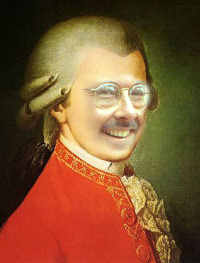A 365-Day Project
"We Are All Mozart"
A project to create
new works and change
the perception of the
music of our time.


 June 7, 2006
June 7, 2006 
Last night I was watching "The 4400" (I've been a science fiction reader and watcher since I was a kid) and I realized how terrible the music was. John Van Tongeren is the composer.
This is not an argument with Van Tongeren. I've composed only a little background music, mostly for local documentary videos, so I'm clearly not walking in his shoes. Maybe he had a bad day. "The 4400" is one of the sci-fi soap-operas -- like the retread of "Battlestar Galactica" -- that don't often catch my interest. They're more concerned with creating easily consumed, caricatured interpersonal relationships than actually applying much sci to the fi, existing in the lightweight tradition of goodguy/badguy/no-sci "Star Wars". (John Williams seems to have cribbed the entire main title of "Star Wars" from Erich Wolfgang Korngold's score to The Private Lives of Elizabeth and Essex. Really. Go listen. By the time you hit the Grand March, you'll wonder if that music was somehow imprinted on the then seven-year-old Williams.)
Back on topic. This is not an argument with Van Tongeren (or Williams). It is an argument with cheap music in general. Before this gets mixed up with the Cheap Art movement or the Fluxus days, or any other cyclic anti-high-art manifesto, I'll say what I mean: Cheap music is sound deliberately wrought for consuming and discarding. It has no levels of texture, it fills but does not satisfy, it has by itself almost no meaning, it does not suggest its context, and by and large its purpose is pleasuring.
If you don't know what I mean, then we're in an existential headlock. And I'd rather drink lots more coffee than do that, ever.
There are two reasons cheap music concerns me right now. A composer recently wrote to remind me that "less is more." And there is a resurgence in the discomfiture with writing for audiences. (Really, I thought we'd outgrown that in the nonpop musical culture. What happened?)
At what point does our nonpop 'art' music fall over into the cheap? I think back to a conversation with a composer whose works I knew could be better, as previous works had been better. By better, I mean art that stops someone in their tracks and makes them think "!" or "?". Instead, this composer's recent music was tailored to pleasure the audience, and no more. Is it a bad thing? Does it cheapen the art? Is it somehow more art-like to do a Mahler, all angst, or a Stockhausen, all portentousness? How about strings of leitmotiven? Good? Cheap? What about the deliberate politics of Fred Ho or sexuality of David Del Tredici? Must art just be high concept?
Yes, it's confusing, and oh do I hate to lapse into ikiwihi ("I know it when I hear it").
Cheap music pulls from libraries -- mental ones or recorded ones -- to assemble jolts of pleasure, fear, surprise, tension. You can almost hear them when I say them, yes? Maybe not so with Monteverdi's Il Combattimento di Tancredi e Clorinda, because he gave us that very language ab initio, or with Beethoven's Sixth Symphony Gewitter, Sturm and its expansive concept of painting image in sound. Once these elements become common currency, though, what would be the expectation of art? Simply to use them as snap-togethers, or to go beyond them, to recontextualize them? I believe it (our nonpop 'art' music) was and is "!" and "?" but not ":-)" or ":-(". Art is ambiguous or powerful or insightful or subversive or questioning or restless or luscious or bewildering, but never easy (pace again, Fluxus).
We are informed that background music and film music do their jobs best when they do not call attention to themselves, do not produce "!" or "?" alone. They are cooperative with the images. They are not memorable for themselves.
The latter makes no sense. Cheap music is not memorable for itself, but film or television music can be iconic, entering the culture first through image, but then leaving the image behind. You know what I mean. "Fweep! Fweep! Fweep! Fweep!" "Doo-doo-doo-doo, doo-doo-doo-doo..." "Bum-ba-bummm, ba-bum-bum-bum-baaa!" Some of it is title music, but it can carry itself in the film with underlying self-excerpts, and carry itself into the culture to live a self-standing existence. Cheap music doesn't have this character. Cheap music fills silences like sloppy mortar, unable to hold up its own structure. It piles up bricks of happy, sad, fear, surprise, tension -- which all falls down when one's back is turned. (Yes, I know, too much ikiwihi.)
Cheap music is analogous to paint-by-number. Given a palette and numbered outline, the artist colors in the blanks, with just enough messiness to make each paint-by-number canvas unique. Cheap music is made from libraries -- mental libraries among the skilled, manufactured production music for the rest. (Yes, a composer actually created the individual clichés represented by production music, and there's powerful technique involved.) Art music is no exception to cheapness, as my composer friend's work reveals -- too much use of the cliché, the art music equivalent of production music.
I'm getting away from myself here, apparently trying to make a somewhat defensive point by explaining too much, my own words engaged in thrust and parry with each other. So it's settled; I will depend on ikiwihi.
And now to a long aside on why ikiwihi is so compelling, and from where validation arises: Each of the arts exists in its own form and language, and trying to translate them into words will always fail, just as verbal analysis will fail to be meaningful within the artform's context. Here is some commentary I wrote two weeks ago:
|
A chocolate may be told by an analysis, or novel by a building, or a sculpture by a novel, or a perfume by a film, or a symphony by a dance, or a pie by a photograph -- but only as an attempt at re-evolving the work from the beginning in a new way, in its own artform. There might even be enough cultural commonality to evince one experience from another, but no more. In other words, please tell me a symphony. Please cook me a dance. Please smell me a photograph. So there is something head-smackingly, jaw-droppingly, brow-squinchingly painful about reading attempts to make these translations, to brew words from beer, to hear words in string quartets, to see words inside paintings. Like the generic innocent victim who is about to open the door in a horror movie, we scream to ourselves, "oh, no, don't, not again!" But it happens again, and like Einstein's definition of insanity -- to repeat the same behavior while expecting different results -- the door opens and the horrors ensue. Yet opening the door to Freddy remains a favorite philosophical pastime, this attempt to gobble up other artforms into words, to see the urinal in subjects and predicates. A urinal is not a pipe, nor a pronoun. (Philosopher Arthur Danto thought he found a renewal of aesthetics, and then writes, "Works of art are representations, not necessarily in the old sense of resembling their subjects, but in the more extended sense that it is always legitimate to ask what they are about." Watch out for that door, Art! [Oooooo, the irony in that name.]) There are instructions for re-creating some of these. Recipes, scores, blueprints (are they still blue?), labanotation, formulas. There are instructions by oral tradition, storyboard, visual mimicking, apprenticeship, cultural threading. Some of these have been called languages, particularly the sophisticated instructions such as musical scores. But they aren't languages. The artwork itself is in its language, and can be its language. Which gets me the long way around to it: Aesthetics and philosophy don't even need art, and I think the dadaist and postmodernist artists were especially overjoyed at leading these media translators to the well of confoundedness, as they dip in the dark for connotations that can be discovered and described and cataloged. It's delightful to see the little trails of pipes and urinals and angels and breadcrumbs left behind just for that purpose. This gotcha game isn't really new, it's just evolved from church to philosopher to critic. While watching the artist/magician, the critic will be distracted from the real action and be taken in by what is presented. An analysis will address what is seen and the mechanism of what is seen -- viewer and object. Danto also writes about observer and object. But in his quote, it's revealing to replace the idea of the art object with the magician's presentation: "Aestheticians have thought to find some utility in the concept of psychic distance, a special insulation that a transformation of attitude puts between us and the magician of our attention, and which is meant to contrast with what is designated the practical attitude. The basis for the distinction is to be found in Kant's Critique of Judgement, where it sounds, and is perhaps meant to sound, as if there are two distinct attitudes that can be taken toward any magician whatsoever, so that the difference in the end between magic and reality is less a difference in kinds of things than in kinds of attitudes, and hence not a matter of what we relate to but how we relate to it." So is there any way to deal with the question of art? Oh, yes. In the language which it uses: ...Rolling over the artwork in the eye or ear or mouth or nose or hand. To feel it, sense it, to go inside it, to dare to explore its private places on its terms, not to stand back in psychological/philosophical observation. Don't speak. It is risky, terrifying, because it must suspend not only belief, but also beliefs. It erases the "psychic distance," and when confronted by a commonplace that has been transfigured, it expects that transfiguration to become part of the receiver. That means, of course, that the claim of art-ness must be accepted as well. Words must, by their very incapability, be erased. The acceptance of art-ness is especially difficult after the dada, the expressionist, and the postmodern. One's status gets involved. "Who am I to...? Do I know what it really...? Will I be embarrassed if...? Can I really believe...?" Verba fierent Bruti. Though one may be betrayed by the occasional pipe or urinal or soup can, no one is harmed in the experiencing of the art (or rarely: John Charles Fare and Dexter Sandap). The eventual post-shock iconography of pipes and urinals and soup cans provides a different kind of validation. |
I need to save the question of addressing audiences, and how all this relates to my trepidation of my own project, for another day. For now instead, here is this image from last winter, taken at the crossing which passes nearby our house. It suggests what I'll be facing on January 1, 2007.
